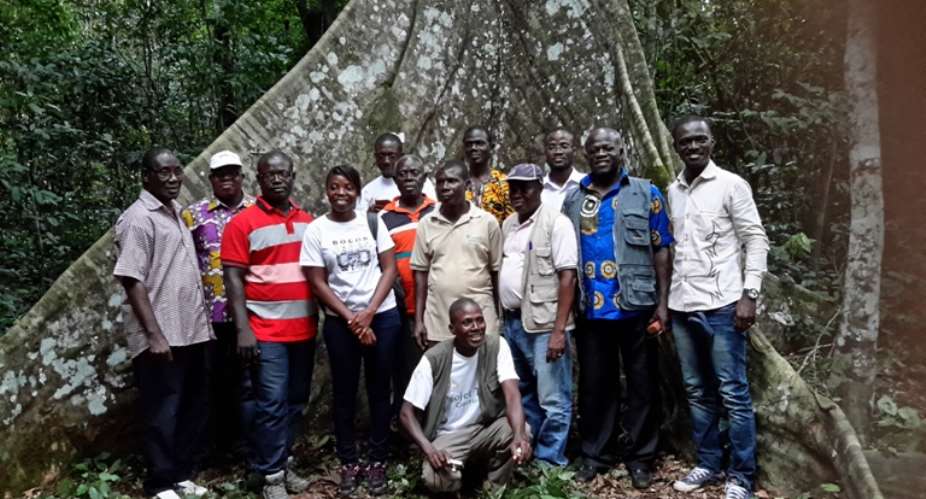Most West African countries have integratedthe formal (scientific) system of natural resource management with community-based approach to ensure long-term sustainability of natural heritage use. In recent times, the governments of Ghana and Cote d’Ivoirehave intensively used these approaches to increase the level of communities’ involvement particularly in the management of off-reserves.
Although both approaches have provento be effective, theiracceptance by rural communities will depend, to a large extent, on how these management strategies influence community livelihood and the health of agricultural production landscapes.
The GEF/FAO funded Trans-boundary Project between Ghana and Cote d’Ivoire, has an environmental objective to establish a viable and sustainable trans-frontier conservation area (TFCA) that links forest reserves and protected areas in and around Bia in Ghana and Diambarakro in Côte d’Ivoire. Global benefits of the project will include improved biodiversity conservation in the protected areas and production landscape within the TFCA and reductions in the barriers to sustainable forest and land management.
In working towards achieving this key objective, a three-day study tour was organizedfor over 15 Executives of Community Resource Management Areas (CREMA)fromBia (Ghana) and 15 members of Community Forests Leaders within Diambarakro (Cote d'Ivoire) todeepen their knowledge about thedifferent community resource management approachesin both countries. Beneficiaries of the study tour in Ghana and Cote d’Ivoire,also shared experiences on ‘what has worked’ and ‘what has not worked’.
While on the study tour, the Community Forest leaders in Cote d’Ivoire emphasized the importance of cultural and traditional practices in the conservation of forests. These practices have proven effective in managing community forests in Cote d’Ivoire.
The CREMA Executives in Ghanarecounted how the influence of religion and, modernism have weakenedthe cultural beliefsthat used to underpin the management of natural resources in the past. TheIvorian counterparts considered the CREMA initiative that gives legal rights to communities to manage their natural assets and at the same time provide them with additional livelihoodsas a good option.
They called on both governments to ensure the integration of traditional knowledge systems into formal approaches for managing natural resources. They appealed to SODEFOR to initiate action towards providing legal protection to community forests in Cote d’Ivoire.
Mr. DoguiAboa, the Technical Advisor to the Director General of SODEFOR, and Mr. Jean Baptiste, a representative of the Ministry of Forests and Water in Cote d’Ivoire,in an interview with Modern Ghana assured participants that, they will collaborate with the relevant statutory institutions to explore the possibility of providing legal protection to community forests.
The International project coordinator, Ms. Abigail Frimpong, expressed satisfaction about the outcome of the study tour and was optimistic that the lessons learned could help improve the management of community forests in both countries. She appealed to the governments to helppromote additional livelihood initiatives to lessen the dependence on natural resources.





 Lay KPMG audit report on SML-GRA contract before Parliament – Isaac Adongo tells...
Lay KPMG audit report on SML-GRA contract before Parliament – Isaac Adongo tells...
 Supervisor remanded for stabbing businessman with broken bottle and screwdriver
Supervisor remanded for stabbing businessman with broken bottle and screwdriver
 NDC watching EC and NPP closely on Returning Officer recruitment — Omane Boamah
NDC watching EC and NPP closely on Returning Officer recruitment — Omane Boamah
 Your decision to contest for president again is pathetic – Annoh-Dompreh blasts ...
Your decision to contest for president again is pathetic – Annoh-Dompreh blasts ...
 Election 2024: Security agencies ready to keep peace and secure the country — IG...
Election 2024: Security agencies ready to keep peace and secure the country — IG...
 People no longer place value in public basic schools; new uniforms, painting wil...
People no longer place value in public basic schools; new uniforms, painting wil...
 'Comedian' Paul Adom Otchere needs help – Sulemana Braimah
'Comedian' Paul Adom Otchere needs help – Sulemana Braimah
 Ejisu by-election: Only 33% of voters can be swayed by inducement — Global InfoA...
Ejisu by-election: Only 33% of voters can be swayed by inducement — Global InfoA...
 Minority will expose the beneficial owners of SML, recover funds paid to company...
Minority will expose the beneficial owners of SML, recover funds paid to company...
 Prof. Opoku-Agyemang has ‘decapitated’ the NPP’s strategies; don’t take them ser...
Prof. Opoku-Agyemang has ‘decapitated’ the NPP’s strategies; don’t take them ser...
